
This video discusses the various ways in which academic libraries and their librarians are supporting the Open Education Movement.


This video discusses the various ways in which academic libraries and their librarians are supporting the Open Education Movement.

This is an introductory-level course designed for global post-secondary educators interested in learning more about open education, open educational resources (OER), and open educational practices (OEP). The purpose of the course is to increase awareness and use of OER as part of global teaching and learning, and to connect education communities with each other. Participation within the course discussion forums requires enrolment through the OpenLearn system and may enrich your learning experience through interactions. There will also be social media and blogging opportunities to connect through Twitter and other spaces that you choose.
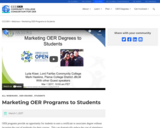
OER programs provide an opportunity for students to earn a certificate or associates degree without incurring the cost of textbooks for their courses. This can dramatically reduce the cost of attendance and has been estimated at 25% or more savings*. Most OER programs are developed to serve the neediest students who may otherwise have to defer college or take fewer courses due to prohibitive cost. Reaching the students who could most benefit most from enrolling in OER courses can prove to be a challenge in of itself. We will hear from speakers who have developed successful strategies at their colleges to create awareness and encourage underrepresented students to enroll in OER degree programs targeted at their academic success.

Locate and use numeric, statistical, geospatial, and qualitative data sets, find data management templates, find data repositories to house your own data and find tools for data visualization.
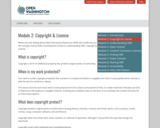
We will start the lesson discussing what open educational resources are. Please watch the video first and read through the content. It is important to understand the concept of open educational resources as it will be the base for the rest of the modules.
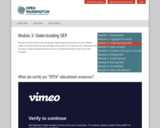
A license is a document that specifies what can and cannot be done with a work. It grants permissions and states restrictions. Broadly speaking, an open license is one that grants permission to access, re-use and redistribute a work with few or no restrictions (definition from Openedefinition.org).
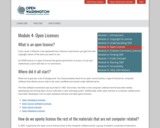
In previous modules we had a chance to discuss the background of open licenses and what they are. We learned that Creative Commons (CC) is the most widely used open license for open educational resources. In this module, we will discuss CC licenses– what they are, to what they pertain, and how to mark our works with them.
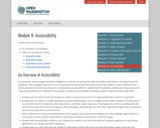
Why do open educational resources matter? What is the point of using OER? Below are some of the benefits of using open educational resources that I have seen while working with OER over the past several years.

We intend this book to act as a guide writ large for would-be champions of OER, that anyone—called to action by the example set by our chapter authors—might serve as guides themselves. The following chapters tap into the deep experience of practitioners who represent a meaningful cross section of higher education institutions in North America. It is our hope that the examples and discussions presented by our authors will facilitate connections among practitioners, foster the development of best practices for OER adoption and creation, and more importantly, lay a foundation for novel, educational excellence.
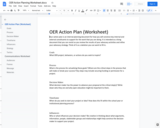
Your action plan is an internal planning document for how you will convince key internal and external constituents to support for the work that you are doing. It is intended as a living document that you can revisit as you review the results of your advocacy activities and refine your advocacy strategy. Think of it as a skeleton you can work to fill in.
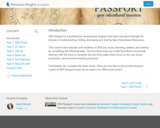
OER Passport is a professional development program that takes educators through the process of understanding, finding, developing and sharing Open Educational Resources.
This course trains teachers and students on OER use, reuse, licensing, creation, and sharing by completing the following tasks. The first three tasks lay a solid foundation and provide teachers with the tools to complete the last three tasks which focus on the use, reuse, production, and innovative teaching practices.
Participants can complete the tasks online. There are also files to print/create physical copies of OER Passports that can be used in an offline environment.
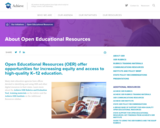
Open Educational Resources (OER) offer opportunities for increasing equity and access to high-quality K–12 education. Many state education agencies now have offices devoted to identifying and using OERs and other digital resources in their states. To help states, districts, teachers, and other users determine the degree of alignment of OERs to the Common Core State Standards, and to determine aspects of quality of OERs, Achieve has developed eight rubrics in collaboration with leaders from the OER community.
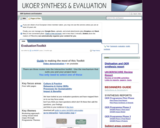
The toolkit is made up of three elements:
1). information and resources to support your evaluation activities
2). an interactive tool to guide you through our Evaluation and Synthesis framework, providing an opportunity to submit findings, observations and links to evidence AND which feeds this back to you for inclusion in your project reporting mechanisms
3). examples of evaluation materials, instruments and reports from other UKOER projects

The OER Toolkit aims to improve equitable access to open learning resources and services to college students by providing a province-wide academic support platform for faculty to use while designing courses and assignments. The Toolkit is a one-stop guide to open educational resources, providing faculty and library staff with tools and information to understand, engage with, create, and sustain OER in their work and practice.
The Toolkit is designed to be used by anyone involved with OER at an academic institution, whether you are part of a team that is collaborating to create OER, a library staff member who is supporting OER development and use, an advocate for OER at your institution, or an instructor seeking to incorporate OER and open pedagogy in the classroom. The primary purpose of this Toolkit is to support faculty and library staff at Ontario colleges; however, it is openly available for use beyond the Ontario college community.
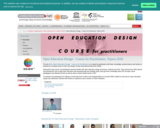
The aim of the Open Education Design - Course for Practitioners is to equip the participants with basic knowledge, practical advice and hands-on experience to prepare them for their own design of Open Educational Resources (OER).
During the 5-day course, the participants became familiar with open education design processes, methods and tools. They learned from OER experts and practitioners how to align open education with developmental and strategic goals, they got basic knowledge about OE concepts, about pedagogical and didactical issues as well as about content related issues in OE.
To empower the participants for making a crucial step from an idea to the implementation of concrete OERs, platforms and tools for open education design was addressed, followed with hands-on experience and a session on OER evaluation.
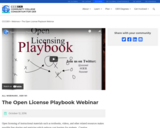
Open licensing of instructional materials such as textbooks, videos, and other related resources makes possible free sharing and remixing which reduces cost barriers for students. Creative Commons provides the legal infrastructure for easily sharing creative works including instructional materials but how do the different licenses indicate a resource can be re-used. Join us for an interactive session of playbook license scenarios where you test your knowledge of the OER re-use based on license type.

This is a supplementary video for the Commonwealth of Learning Open Textbook Manual. It shows how to create Lessons in OER Commons. The OER Commons Lesson Builder allows instructors to create resources that are viewable by students as lessons, and by teachers as lesson plans with supplemental instructional resources.
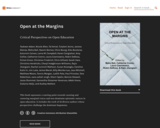
This book represents a starting point towards curating and centering marginal voices and non-dominant epistemic stances in open education. It includes the work of 43 diverse authors whose perspectives challenge the dominant hegemony.

Academic libraries are undergoing evolutionary change as emerging technologies and new philosophies about how information is created, distributed, and shared have disrupted traditional operations and services. Additionally, the population that the academic library serves is increasingly distributed due to distance learning opportunities and new models of teaching and learning. This article, the first in this special issue, suggests that in today’s increasingly networked and distributed information environment, the strategic integration of open curation and collection development practices can serve as a useful means for organizing and providing structure to the diverse mass of available digital information, so that individual users of the library have access to coherent contexts for meaningful engagement with that information. Building on insights from extant research and practice, this article proposes that colleges and universities recognize a more inclusive open access environment, including the integration of resources outside of those owned or created by the institution, and a shift toward policies that consider open access research and open educational resources as part of the library’s formal curatorial workflow and collection building. At the conclusion on this article, authors Lisa Petrides and Cynthia Jimes offer a commentary on the six remaining articles that comprise this special issue on Models of Open Education in Higher Education, discussing the significant role that “open” policy and practice play in shaping teaching, learning, and scholarship in the global context of higher education.
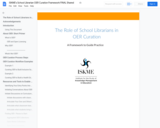
This document is an evidence-based guide that outlines the practical and policy supports needed to enable K-12 school librarians to take on leadership roles around OER, and to support OER curation efforts by librarians and all educators.
This guide is based on a study led by ISKME (iskme.org) in collaboration with Florida State University's School of Information. The study is titled “Exploring OER Curation and the Role of School Librarians". ISKME designs guides and toolkits that help educators navigate and implement new teaching and learning practices. Grounded in research, our evidence-based guides and toolkits help articulate what actually works in real education settings—and are tailored to the unique professional learning needs of our clients and their stakeholders.
The study was made possible in part by the Institute of Museum and Library Services (www.imls.gov), under grant number LG-86-17-0035-17. The findings and recommendations expressed in this document do not necessarily represent those of the Institute of Museum and Library Services.